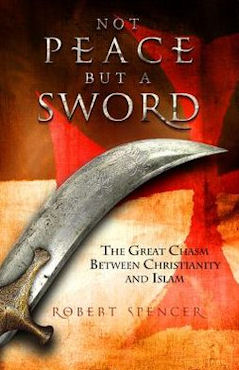
|
Posted May 20, 2013
Book: Not Peace But A Sword: The Great Chasm Between Christianity and Islam Author: Robert Spencer Catholic Answers. Cajon, CA. 2013. Pp. 251 An Excerpt from the Jacket:
Some Christians view Islam as a sister religion, a branch of the same Abrahamic tree --- lacking the fullness of revelation but nonetheless a religion of peace. Others are more critical of Islamic teachings but still see Muslims as valuable partners in the global fight against secularization and the Culture of Death. In Not Peace but a Sword, Robert Spencer argues they're both wrong --- and warns Christians against the danger of thinking that Islam is an easy ally. Many Christian groups, including the Catholic Church do recognize whatever is good and true in Islam, and their leaders rightly pursue peaceful accord and common ground with all religions. Spencer argues, however, that real peace can come only from truth. Where there is falsehood in Islamic doctrine, morals and practice, papering over the the truth actually hurts the cause of peace. And so Spencer, the New York Times best-selling author of more than a dozen books dealing with Islam and the West, shines the light of truth on areas where Christians and Muslims don't just quibble over small details, but fundamentally disagree, including: The character of God, Jesus, and divine revelation The nature of truth and the source of moral law Religious freedom and other basic human rights Life issues, marriage, and sexual morality The rights and dignity of women He demonstrates how these differences are not academic but real-world. They are critical and drive Muslim behavior toward Christians and others. If we fail to open our eyes to these differences, we do so at our peril. An Excerpt from the Book: Secularism is encroaching upon the West, making it ever more difficult to hold fast to the fullness of the Faith in a culture that is daily growing more hostile to it. In such a world it is always good to have allies. Pope Benedict XVI enunciated a noble aspiration in September 2012 when he said to young Muslims and Christians in Beirut: "It is vital that the Middle East in general, looking at you, should understand that Muslims and Christians, Islam and Christianity, can live side by side without hatred, with respect for the beliefs of each person, so as to build together a free and humane society." It is indeed up to Muslims worldwide, particularly in Pakistan and Egypt, where Muslims are persecuting Christians with increasing ferocity, to demonstrate that that harmony is possible. Yet a true ally is not one who is likely to turn and join one's enemies in the struggle, or to initiate new hostilities within the alliance once the battle is won. The doctrines of Islam that inculcate among all too many Muslims hatred and suspicion of Christianity and Christians have never been reformed or rejected by any Islamic sect. Catholics who believe that their Muslim dialogue partners desire to establish a lasting friendship, or who trust Muslims to be faithful brother-in-arms in the culture war, should proceed with full awareness of the contents of Islamic doctrine, and with an awareness of the many pitfalls involved. Ultimately, the requirements of charity do not include the denial of the truth. We may want to believe that Islam is a spiritual cousin and a moral partner, and that idea may be greatly comforting, but its comforts will one day evanesce before the sword that the complacently self-deceived had thought they had staved off forever. Table of Contents: 1. Time for an "ecumenical Jihad"? 2. Three great Abrahamic faiths? 3. The same God? 4. The same Jesus? 5. Are we all Muslims now? 6. A common desire for justice? 7. A shared sexual ethic? 8. An honest desire for dialogue? Conclusion: Not Peace but a Sword Epilogue: The Kreeft/Spencer debate Appendix: Fundamental differences |
|
